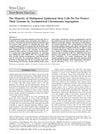 September 2023 in “Research Square (Research Square)”
September 2023 in “Research Square (Research Square)” The document concludes that the new expert system can assess the risk of PCOS effectively despite uncertainties in diagnosis.
 157 citations,
May 2021 in “Endocrine Reviews”
157 citations,
May 2021 in “Endocrine Reviews” Early diagnosis and individualized treatment improve outcomes for Congenital Adrenal Hyperplasia.
 December 2022 in “Dermatology and Therapy”
December 2022 in “Dermatology and Therapy” Alopecia areata needs more recognition and better treatment access in Latin America to improve patient care and outcomes.
 1 citations,
March 2023 in “Nutrients”
1 citations,
March 2023 in “Nutrients” The conclusion is that obesity should be managed with a slow, balanced approach to diet and exercise, with medication and surgery as additional options, and education and access to care are important.
 16 citations,
September 2018 in “Journal of Ethnopharmacology”
16 citations,
September 2018 in “Journal of Ethnopharmacology” Plant-based remedies may treat hair loss by reducing inflammation and improving insulin resistance.
 116 citations,
December 2017 in “International Journal of Women's Dermatology”
116 citations,
December 2017 in “International Journal of Women's Dermatology” Adult female acne treatment should be personalized, considering individual preferences and pregnancy, using various topical and oral medications while managing side effects and resistance.
 January 2019 in “Springer eBooks”
January 2019 in “Springer eBooks” Acne can appear or persist in adulthood due to hormonal changes, external factors, or substance use, and requires appropriate treatment.
 237 citations,
January 2010 in “The Journal of Sexual Medicine”
237 citations,
January 2010 in “The Journal of Sexual Medicine” The report recommends personalized treatment for women's sexual dysfunctions and more research on effective therapies.
 14 citations,
April 2014 in “Medical Clinics of North America”
14 citations,
April 2014 in “Medical Clinics of North America” The document concludes that quick referral and appropriate treatments are crucial for managing common skin conditions and preventing permanent damage.
 49 citations,
July 2004 in “Anesthesiology”
49 citations,
July 2004 in “Anesthesiology” The document concludes that more research is needed to understand how to treat muscle pain with drugs.
 48 citations,
January 2015 in “Indian Journal of Dermatology, Venereology and Leprology”
48 citations,
January 2015 in “Indian Journal of Dermatology, Venereology and Leprology” Vitamin D is important for skin health and can help treat psoriasis, atopic dermatitis, and vitiligo.
 85 citations,
March 2002 in “Body & Society”
85 citations,
March 2002 in “Body & Society” The document concludes that cosmetic surgery is still mainly a practice for women and the gender gap in this field is expected to continue.
 137 citations,
January 2000 in “Skin Pharmacology and Physiology”
137 citations,
January 2000 in “Skin Pharmacology and Physiology” The document recommends using both clinical evaluation and various measurement methods to assess skin greasiness, considering factors like temperature and hormones.
 1 citations,
July 2018 in “Elsevier eBooks”
1 citations,
July 2018 in “Elsevier eBooks” Heredity and hormones cause common hair loss, and topical minoxidil is the first recommended treatment.
 25 citations,
January 2015 in “Advances in Psychosomatic Medicine”
25 citations,
January 2015 in “Advances in Psychosomatic Medicine” Many skin patients also have mental health issues, and doctors should treat both together.
 38 citations,
April 2017 in “Journal of The American Academy of Dermatology”
38 citations,
April 2017 in “Journal of The American Academy of Dermatology” Many skin patients have mental health issues, but few dermatologists are well-versed in treating these conditions.
 22 citations,
May 2011 in “American Journal of Clinical Dermatology”
22 citations,
May 2011 in “American Journal of Clinical Dermatology” Recognizing and managing skin-related psychiatric disorders in children is crucial for effective treatment.
 66 citations,
December 2003 in “Endocrinology and Metabolism Clinics of North America”
66 citations,
December 2003 in “Endocrinology and Metabolism Clinics of North America” Doctors need to be better prepared to assess and treat obesity in patients.
 27 citations,
April 2019 in “Journal of The American Academy of Dermatology”
27 citations,
April 2019 in “Journal of The American Academy of Dermatology” Where melanoma is on the body affects survival chances; melanomas on the back of the head are worse, while those on thighs and arms are less severe, and more sun exposure might improve survival.
 January 2009 in “Springer eBooks”
January 2009 in “Springer eBooks” The document concludes that treating skin conditions should include psychological care and a multidisciplinary approach is essential for effective management.
 1 citations,
September 2023 in “Dermatology and Therapy”
1 citations,
September 2023 in “Dermatology and Therapy” Baricitinib helps improve hair growth in severe alopecia, with better results in less severe cases and higher doses working faster.
 September 2012 in “Hair transplant forum international”
September 2012 in “Hair transplant forum international” The document concludes with the creation of a Hair Transplant Foundation after reviewing the early hair transplant techniques and discussions from a forum.
 2295 citations,
August 2012 in “The international journal of transgenderism/International journal of transgenderism”
2295 citations,
August 2012 in “The international journal of transgenderism/International journal of transgenderism” The guidelines recommend informed consent for gender-affirming treatments and stress the importance of personalized, culturally sensitive care for transgender individuals.
 June 2022 in “bioRxiv (Cold Spring Harbor Laboratory)”
June 2022 in “bioRxiv (Cold Spring Harbor Laboratory)” ILC1-like cells can cause alopecia areata by attacking hair follicles.
 42 citations,
February 1985 in “Journal of the American Academy of Dermatology”
42 citations,
February 1985 in “Journal of the American Academy of Dermatology” Excessive hair growth can be assessed by history, exam, and blood tests, and treated with medication like dexamethasone, birth control pills, and spironolactone.
 61 citations,
September 2008 in “Stem Cells”
61 citations,
September 2008 in “Stem Cells” Most hair follicle stem cells do not protect their DNA by dividing it unevenly.
 254 citations,
September 2014 in “Menopause”
254 citations,
September 2014 in “Menopause” The NAMS 2014 recommendations guide healthcare providers on treating health issues in midlife women, emphasizing individualized care and informed decision-making.
 156 citations,
September 2014 in “British journal of dermatology/British journal of dermatology, Supplement”
156 citations,
September 2014 in “British journal of dermatology/British journal of dermatology, Supplement” Accurate diagnosis and effective oral treatment are key to managing tinea capitis and preventing its spread.
 400 citations,
January 2014 in “British Journal of Sports Medicine”
400 citations,
January 2014 in “British Journal of Sports Medicine” The consensus provided guidelines for treating the Female Athlete Triad and a system to decide when athletes can return to sports.
 February 2024 in “ACS Omega”
February 2024 in “ACS Omega” The Shen Bai Hair Growing Decoction may help treat hair loss by promoting hair growth and reducing inflammation.






























